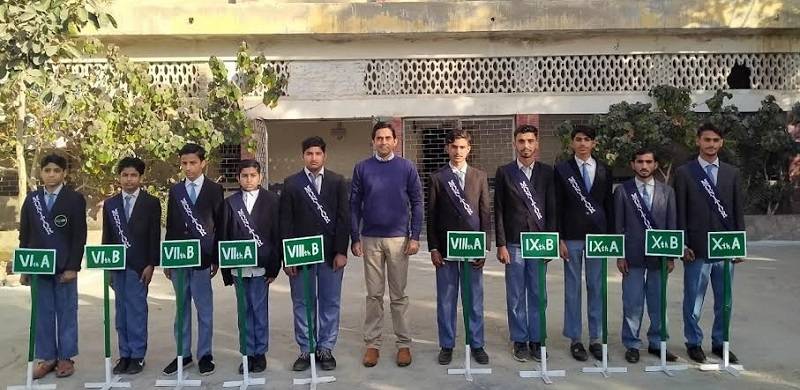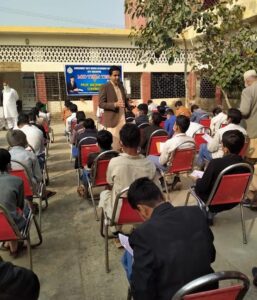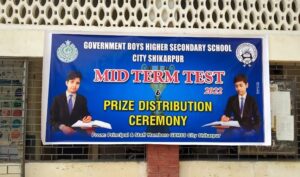
It is no secret that primary education is the fundamental in the development of the younger generations. China and India are both economic powers in Asia because of their advanced and practical education systems, with modern trainings for teaching staff and advanced school labs. The recent appointment of contractual teachers from Sukkur IBA University, graduates with honours degrees in their fields, including Chemistry, Islamiyah, Physics, English and Computer/IT, are no less than a blessing for public schools in Sindh. Government schools in the province were lagging in their curriculum due to outdated practices taken as routine for many decades, far behind private school such as Beacon House School System, Pak-Turk International School and O level, The City School.
Since 2018, the young teaching staff have proven they are game-changers for government schools. They are changing the fates of poor children who go to government schools, despite inadequate and outdated facilities. In particular, the recently appointed IBA-Qualified teachers in the Government Boys Higher Secondary School in Shikarpur, Sindh, are exemplary. Their new teaching curriculum includes modern schedules with mid-terms, follow syllabus, and an advanced mode of conducing exams with proper seating and block wise distribution to ensure transparency and discourage student cheating.
changing the fates of poor children who go to government schools, despite inadequate and outdated facilities. In particular, the recently appointed IBA-Qualified teachers in the Government Boys Higher Secondary School in Shikarpur, Sindh, are exemplary. Their new teaching curriculum includes modern schedules with mid-terms, follow syllabus, and an advanced mode of conducing exams with proper seating and block wise distribution to ensure transparency and discourage student cheating.
The batch of IBA-Qualified teachers are a prize for children studying in government schools, instilling confidence and a candle of hope in our poor pupils, in spite of the poor and broken school building in which they must learn. The new teachers have made headways in ameliorating the dismal conditions of government schools. They are visionary leaders that brighten and enlighten the lives of thousands of poor students.
However, there are still ample deficiencies in running the affairs of government schools in Sindh, such as old furniture, collapsed buildings, and a lack of modern facilities like solar energy, multimedia in the classrooms, computer and science labs, and even filtered or fresh drinking water to meet the needs of these students.
The mismanagements of public schools in Sindh includes over enrolment above the building’s capacity, and a lack of advanced academic and management training for teaching and non-teaching staff. Despite their university degrees, the new teachers have not been allotted subjects relevant to their academic education and expertise.
capacity, and a lack of advanced academic and management training for teaching and non-teaching staff. Despite their university degrees, the new teachers have not been allotted subjects relevant to their academic education and expertise.
Despite making abundant progress in ensuring quality education in Sindh’s public schools, the new teachers are still fighting for their fate and burning midnight oil to secure a full-time government job. The new teachers are employed on contracts, with no provision of annual salary increments. These teachers remain on contractual employment, unlike senior teachers, many of whom are not able to meet the demands of modern education.
The School Education Department Sindh faces a difficult situation which calls for extraordinary measures. Even though the situation is bleak, every dark cloud has a silver lining. It is high time the relevant authorities take necessary measures and chalk out effective strategies to provide basic and modern facilities for public schools, including policy making on capacity-based enrolment. It is only fair that the chief minister of Sindh establishes regular contracts for the newly recruited teachers, along with advanced trainings to enable them to meet the needs of government schools in letter and spirit. Updated government policies are the only way to keep up the tempo of these young and highly professional teachers in rendering their services with zeal and zest. Rather than announcing laptop schemes, the government of Sindh must regularize their services and provide better support to these new teachers.
Since 2018, the young teaching staff have proven they are game-changers for government schools. They are
 changing the fates of poor children who go to government schools, despite inadequate and outdated facilities. In particular, the recently appointed IBA-Qualified teachers in the Government Boys Higher Secondary School in Shikarpur, Sindh, are exemplary. Their new teaching curriculum includes modern schedules with mid-terms, follow syllabus, and an advanced mode of conducing exams with proper seating and block wise distribution to ensure transparency and discourage student cheating.
changing the fates of poor children who go to government schools, despite inadequate and outdated facilities. In particular, the recently appointed IBA-Qualified teachers in the Government Boys Higher Secondary School in Shikarpur, Sindh, are exemplary. Their new teaching curriculum includes modern schedules with mid-terms, follow syllabus, and an advanced mode of conducing exams with proper seating and block wise distribution to ensure transparency and discourage student cheating.The batch of IBA-Qualified teachers are a prize for children studying in government schools, instilling confidence and a candle of hope in our poor pupils, in spite of the poor and broken school building in which they must learn. The new teachers have made headways in ameliorating the dismal conditions of government schools. They are visionary leaders that brighten and enlighten the lives of thousands of poor students.
However, there are still ample deficiencies in running the affairs of government schools in Sindh, such as old furniture, collapsed buildings, and a lack of modern facilities like solar energy, multimedia in the classrooms, computer and science labs, and even filtered or fresh drinking water to meet the needs of these students.
The mismanagements of public schools in Sindh includes over enrolment above the building’s
 capacity, and a lack of advanced academic and management training for teaching and non-teaching staff. Despite their university degrees, the new teachers have not been allotted subjects relevant to their academic education and expertise.
capacity, and a lack of advanced academic and management training for teaching and non-teaching staff. Despite their university degrees, the new teachers have not been allotted subjects relevant to their academic education and expertise.Despite making abundant progress in ensuring quality education in Sindh’s public schools, the new teachers are still fighting for their fate and burning midnight oil to secure a full-time government job. The new teachers are employed on contracts, with no provision of annual salary increments. These teachers remain on contractual employment, unlike senior teachers, many of whom are not able to meet the demands of modern education.
The School Education Department Sindh faces a difficult situation which calls for extraordinary measures. Even though the situation is bleak, every dark cloud has a silver lining. It is high time the relevant authorities take necessary measures and chalk out effective strategies to provide basic and modern facilities for public schools, including policy making on capacity-based enrolment. It is only fair that the chief minister of Sindh establishes regular contracts for the newly recruited teachers, along with advanced trainings to enable them to meet the needs of government schools in letter and spirit. Updated government policies are the only way to keep up the tempo of these young and highly professional teachers in rendering their services with zeal and zest. Rather than announcing laptop schemes, the government of Sindh must regularize their services and provide better support to these new teachers.

